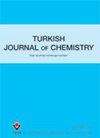Cibacron Blue F3GA ligand dye-based magnetic silica particles for the albumin purification
IF 1.3
4区 化学
Q3 CHEMISTRY, MULTIDISCIPLINARY
引用次数: 0
Abstract
Dye-ligand affinity chromatography is among the increasingly popular affinity chromatography based on molecular recognition for the purification of albumin. This study focuses on the binding of Cibacron Blue F3GA ligand dye with magnetic silica particles and purification by separation. Mono-disperse silica particles with bimodal pore size distribution were employed as a high-performance adsorbent for human serum albumin (HSA) protein purification under equilibrium conditions. The synthesized ligand-dye affinity based magnetic silica particles were characterized by electron spin resonance, Fourier-transform infrared spectroscopy, scanning electron microscopy, vibrating sample magnetometer, elemental analysis, and dispersive X-ray analysis. The HSA purification performance of the proposed material in the presence of a magnetic field was relatively investigated using magnetic-based particles with similar morphologies. The maximum adsorption capacity for HSA in an artificial plasma medium was defined as 48.6 mg/g magnetic silica particle. By using the designed magnetic silica particles, 1.0 M NaCl solution was successfully utilized for obtaining quantitative desorption with HSA. However, continued HSA purification performances of magnetic-based particles were significantly lower concerning the ligand-dye magnetic silica particles. The purity of the removed albumin was about 97%. The magnetic silica particles could be utilized many times without decreasing their protein adsorption capacities remarkably.Cibacron Blue F3GA配体染料基磁性二氧化硅颗粒纯化白蛋白
染料配体亲和层析是基于分子识别的纯化白蛋白的一种日益流行的亲和层析方法。本研究主要研究了磁二氧化硅颗粒对赤龙蓝F3GA配体染料的结合及分离纯化。采用具有双峰孔径分布的单分散二氧化硅颗粒作为高效吸附剂,在平衡条件下纯化人血清白蛋白(HSA)蛋白。利用电子自旋共振、傅里叶变换红外光谱、扫描电镜、振动样品磁强计、元素分析和色散x射线分析等手段对合成的配体-染料亲和磁性二氧化硅颗粒进行了表征。使用具有相似形貌的磁基颗粒,相对研究了所提出材料在磁场存在下的HSA纯化性能。人工等离子体介质对HSA的最大吸附量为48.6 mg/g磁性硅颗粒。利用所设计的磁性二氧化硅颗粒,成功地利用1.0 M NaCl溶液进行HSA定量解吸。然而,配体-染料磁性二氧化硅颗粒的持续HSA净化性能明显降低。所得白蛋白纯度约为97%。磁性二氧化硅颗粒可以多次使用而不会显著降低其蛋白质吸附能力。
本文章由计算机程序翻译,如有差异,请以英文原文为准。
求助全文
约1分钟内获得全文
求助全文
来源期刊

Turkish Journal of Chemistry
化学-工程:化工
CiteScore
2.40
自引率
7.10%
发文量
87
审稿时长
3 months
期刊介绍:
The Turkish Journal of Chemistry is a bimonthly multidisciplinary journal published by the Scientific and Technological Research Council of Turkey (TÜBİTAK).
The journal is dedicated to dissemination of knowledge in all disciplines of chemistry (organic, inorganic, physical, polymeric, technical, theoretical and analytical chemistry) as well as research at the interface with other sciences especially in chemical engineering where molecular aspects are key to the findings.
The journal accepts English-language original manuscripts and contribution is open to researchers of all nationalities.
The journal publishes refereed original papers, reviews, letters to editor and issues devoted to special fields.
All manuscripts are peer-reviewed and electronic processing ensures accurate reproduction of text and data, plus publication times as short as possible.
 求助内容:
求助内容: 应助结果提醒方式:
应助结果提醒方式:


